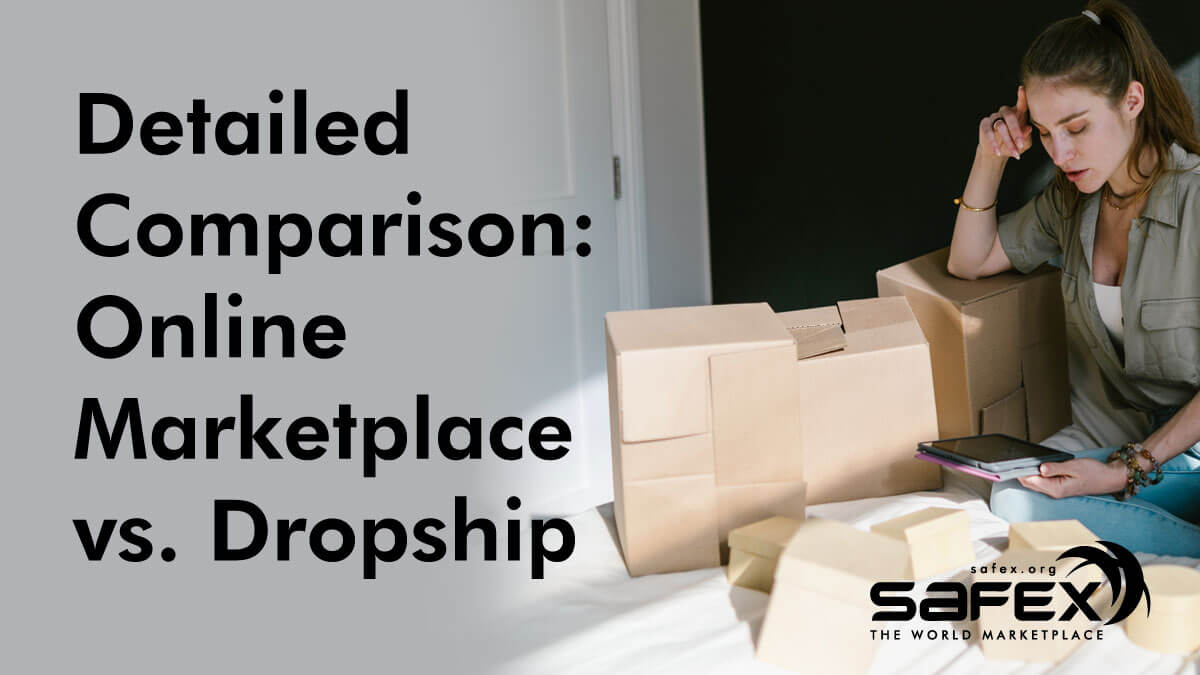Online Marketplace vs. Dropship: Detailed Comparison
Deciding between an Online Marketplace vs. Dropship is way easier with this guide. We’ll go through the essentials and offer you a comparison of these two, hopefully helping you pick the right choice.

Entering the eCommerce business world is a thrilling task, but it can turn into an intimidating one. However, many people nowadays agree that the eCommerce world offers great opportunities to entrepreneurs who want to make their ideas come to life, and it is constantly expanding. Deciding where to start is one of the most daunting tasks, but it is crucial before starting your business. A good starting point will ensure you continually increase eCommerce revenue. We’ve come to notice there’s been some misconception when it comes to online marketplace and dropship. Therefore, we decided to break down the subject and go through the different benefits and challenges of these two options, helping you choose between Online Marketplace vs. Dropship.
Online Marketplace
We’re all quite familiar with marketplaces such as eBay and Amazon. You might already know how they work, but let us present a more general explanation. In the case of an online marketplace, one party sells a good, while the other party delivers it to the customer on its own behalf. From the customer’s point of view, the product came from that second party, even though it was purchased at another site because the branding on the box is by the second party.
- Benefits of an Online Marketplace
The buyers tend to trust the well-known marketplaces. Therefore, if you’re using one that has a good reputation, the customers will more likely trust in their payment. Additionally, some marketplaces offer alternative payment methods growing in popularity and people’s trust (for a good reason). Another benefit of an online marketplace is that you’d have reduced costs, as many marketplaces handle SEO, marketing, and order fulfillment themselves. - Challenges of an Online Marketplace
Starting with an online marketplace is usually advisable because there are not too many challenges. However, the marketplace customers will always be just that. If you’d like to have your customers, you’d have to start all over again.
Dropship
Dropshipping refers to one party selling the goods and the other party (a wholesaler or a manufacturer) delivering the goods on behalf of the seller. The box’s branding has the first party’s (retailer’s) name and brand on it. Therefore, the retailer never really gets in touch with the product itself. From the customer’s point of view, the box came directly from the site they purchased at.
- Benefits of Dropshipping
Since you don’t have to stack the goods you’re selling, you won’t have to pay for them before they’re sold. Also, you won’t have to pay for products that are not sold. Another plus is that dropshipping doesn’t require much starting costs. Lastly, you’ll be able to gain, maintain and expand your customer base. - Challenges of Dropshipping
As a dropshipper, you rely a lot on your supplier. If he doesn’t have your best-selling product on the stack, you’ll have to deal with unsatisfied customers. Finding a high-quality supplier whom you can trust is not as easy as it seems. Lastly, since the markets are oversaturated, you’ll have to do some research and find a niche market to make your business profitable.
Online Marketplace vs. Dropship: Key differences
Even though both dropshipping and marketplaces don’t physically control the products they’re selling, there are some differences between the two that might help you decide between the two. They are different in terms of:
- Business model - A marketplace and dropshipping don’t use the same business model, and the way they make money is also different. A marketplace will gather cash from the customers, keep a specific part to themselves, and then give the rest of the money to the supplier. On the other hand, drop shipping refers to a retailer collecting money from the customers and remitting the negotiated amount to the vendor (including the fulfillment costs). The difference belongs to the drop shipper.
- Accounting - Dropshippers record both costs of goods sold (COGS) and the total revenue. On the other hand, a marketplace provider will sell a 200$ item and count only 20$ as the revenue (if a marketplace fee is 10%).
- Price - Drop Shipping retailers control the prices of the products they’re selling. On the other hand, marketplaces let sellers dictate the price.
- Selection - With marketplaces, the retailer doesn’t control the products from third-party sellers. On the other hand, drop shipping retailers select, curate and merchandise products.
- Fulfillment - The retailer doesn’t control the fulfillment in either of the two models. Dropshippers dictate the fulfillment method to their suppliers, while marketplaces allow sellers to choose between different shipping methods and carriers. As shipping costs typically fall down to them, drop shippers can implement various strategies to increase their revenue, such as offering free shipping while slightly increasing their products’ prices, charging their customers a flat shipping rate, etc.
- Source - Marketplaces allow customers to see all the products of a particular brand by providing their sellers a storefront inside a broader eCommerce website. On the other hand, dropshipping doesn’t allow customers to see if someone else is also fulfilling a product other than the retailer.
- Customer service - During a marketplace transaction, the customer will contact the seller directly to return a product. In the case of dropshipping, the customer reaches the retailer, who then arranges with its suppliers.
Final thoughts
Depending on your personal and business goals, and considering our comparison above, you should be able to decide between an online marketplace vs. dropship when joining the eCommerce business world. If you’re looking for an option that requires less capital and an easy start, dropshipping may be your choice. If, however, you’re looking to start your business using an online marketplace, we suggest you consider using a blockchain-based eCommerce platform, such as Safex Market powered by Safex blockchain. Such platforms are decentralized, so they avoid intermediaries, offer security, and provide more efficient payments.
